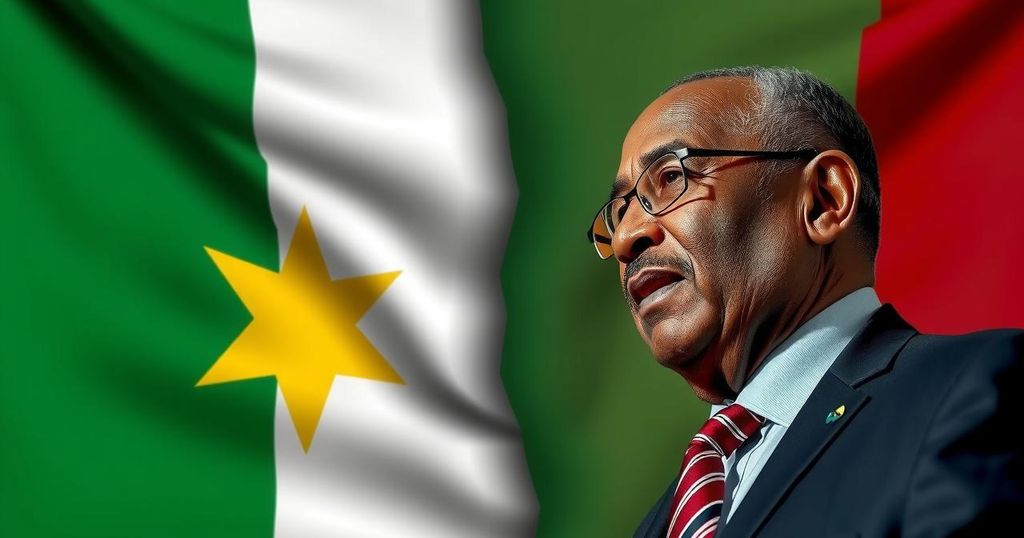The Peril of President Hassan Sheikh Mohamoud’s Policies on Somalia and the Horn of Africa
The article examines how President Hassan Sheikh Mohamoud’s envy of Ethiopia and refusal to acknowledge Somaliland’s independence threaten regional stability in the Horn of Africa. By obstructing Ethiopian access to Red Sea ports and undermining Somaliland, his policies risk igniting tensions and conflict. The need for international support for Somaliland and cooperative ties with Ethiopia is emphasized to foster peace and development in the region.
The Horn of Africa is a region characterized by intricate historical, political, and economic factors that dictate its power dynamics. Presently, a significant threat to the tenuous stability of this area emanates from the actions of Somalia’s President, Hassan Sheikh Mohamoud. His administration’s policies place the lives of approximately 120 million individuals at risk and jeopardize the bilateral relations between Somalia and Ethiopia. President Mohamoud’s refusal to recognize Somaliland’s right to self-determination and his attempts to obstruct Ethiopia’s access to the Red Sea ports could lead to disrupted alliances, foster regional animosities, and destabilize the delicate geopolitical equilibrium of the Horn. Since its secession from Somalia in 1991, the Republic of Somaliland has emerged as a distinct entity, establishing a democratic governance structure alongside significant economic development. Somaliland’s strategic location next to Ethiopia has permitted it to negotiate a multitude of international agreements, such as the collaboration with the UAE to manage Berbera Port. This has reinforced Somaliland’s status as a pivotal player in the regional economic landscape, particularly as around 40 million Ethiopians depend on trade routes through the Red Sea. President Mohamoud’s initiatives to impede Somaliland’s evolution and impose sanctions pose a direct threat not only to Somaliland but also to Ethiopia’s economic viability. His position has been construed as a political error with the potential to rekindle tensions in the Horn of Africa, especially regarding Ethiopia—a key player in the region’s stability. The necessity for Ethiopia to secure reliable access to ports in the Red Sea is vital to its geopolitical interests, and President Mohamoud’s attempts to restrict this access could incite hostility. Somalia’s ongoing internal chaos further complicates this precarious situation. For more than thirty years, Somalia has grappled with civil strife, terrorism, and foreign interventions. As Somaliland has basked in relative peace and progress, Somalia has remained dependent on the African Union forces to combat the Al-Shabaab insurgency. The focus of President Mohamoud on undermining Somaliland, rather than concentrating on stabilizing his own devastated nation, risks prolonging Somalia’s difficulties and obstructing the formation of a stable government in the south. Moreover, the dynamics are further complicated by Egypt’s involvement in the region. President Mohamoud’s alignment with Egypt through the tripartite agreement with Eritrea and Somalia threatens to disrupt the regional balance. With Egypt seeking to secure its interests regarding the Nile, Mohamoud’s policies could potentially be exploited as leverage against Ethiopia, instigating proxy conflicts, particularly in southern Somalia, which may set back developmental endeavors by several decades. To avert an escalation of tensions, the international community must prioritize the support of Somaliland’s right to self-determination and encourage economic cooperation with Ethiopia. Establishing robust economic connections between Somaliland and Ethiopia could yield significant benefits for a population of 120 million individuals. It is crucial that personal aspirations, religious biases, or envy do not obstruct the pathway to progress. Ultimately, the policies advanced by President Mohamoud risk fostering a legacy of conflict and strife, with repercussions that extend throughout the Horn of Africa. His refusal to acknowledge Somaliland’s independence, compounded by his antagonistic posture towards Ethiopia, may instigate long-term hostilities, redefining the geopolitical landscape of the region for generations to come. Acknowledging and safeguarding the partnership between Somaliland and Ethiopia is imperative for the promotion of peace and development.
The Horn of Africa is a geopolitically sensitive region that has historically been shaped by ethnic strife, colonial legacies, and strategic interests of regional and international powers. Somalia’s internal challenges, including a protracted civil war and the rise of militant factions, have impeded its political stability, making interactions with neighboring countries crucial. Somaliland, having declared independence from Somalia in 1991, provides a contrast with its relative peace and democratic governance, positioning itself as an important regional actor. Ethiopia, reliant on Red Sea access for trade, has engaged in various partnerships to secure its economic needs. The interplay of these dynamics is critical to understanding the current tensions and potential conflicts in the region.
In conclusion, President Hassan Sheikh Mohamoud’s policies pose a significant threat to both Somalia and the broader Horn of Africa. His refusal to recognize Somaliland’s independence and efforts to obstruct Ethiopia’s access to essential trade routes could lead to regional instability and conflict. The need for international support for Somaliland’s self-determination and the promotion of cooperative economic ties with Ethiopia is urgent to ensure regional prosperity and peace. Failure to navigate these intricate dynamics could result in enduring turmoil, impacting millions of lives.
Original Source: www.modernghana.com




Post Comment